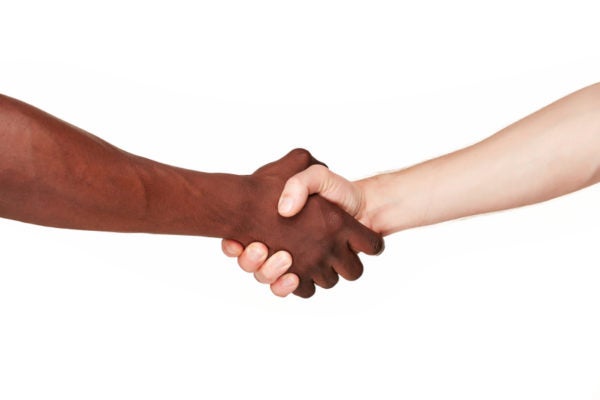We are living in uncertain, unprecedented times. Droplets, quarantine, social distancing are now common, everyday words. Toilet paper, masks and hand sanitizer are the new gold. Vacation plans and savings funds have been leveled. The ways we live, work and connect have changed, at least for the near future.
But this is not about those changes, the politics, media reaction or who is to blame. This is about handshakes – and related opportunities.
I recently had some furniture dropped off. The delivery man greeted me with an over-priced chair and an outstretched hand.
I offered a “corona” fist-bump instead. My awkwardness was met with his puzzlement, with perhaps some disrespect. We chatted about the crisis and connected over our love of sports. We talked about how we were both missing March Madness. I left by saying, “This is the real March Madness.” He laughed and offered his fist before jumping in the truck.
The well-documented guidelines regarding avoiding handshakes are no joke. Shaking hands is one of the easiest ways for viruses to be passed. Hands are an extremely efficient vehicle, an absolute Ferrari, for the transmission of infectious diseases.
Shaking hands doesn’t differ significantly in exposure rates to sneezing in one’s face. It’s just less dramatic. If you have the virus and shake someone’s hands, and he touches his face, you both probably become a statistic.
But it is not easy to give up this social tradition. It can be extremely difficult to make behavioral changes that are a part of our everyday routine. Even President Donald Trump reflected on the custom, recently commenting that “moving away from shaking hands is a good thing.”
The tradition of shaking hands has an interesting history. The details are shaky, but the custom has existed for thousands of years. The origins were meant to convey respect and peace. Extending one’s hand showed you were not carrying a gun. Some have suggested the shaking up and down motion was intended to dislodge knives or other weapons lurking up one’s sleeve.
In 2020, some of these intentions have been left behind, while others remain firm. The handshake is still about communicating trust, connection, shared interests. In a business or personal setting, the shake says, “I see you.”
You shake, you trust. It’s easy, clear and hard to let go. And that’s typically the case with any deeply engrained social tradition.
But if you follow clear recommendations for how to do your part in this health crisis, it’s time to give it up. And there are options.
Letting go of the shake doesn’t mean you are implying the other person might be infected. It’s saying you believe in prevention. It’s doing something small but meaningful to prevent the spread or “flatten the curve” of this frightening pandemic. It’s about protecting yourself and others.
Think of it as a handshake challenge. More of us need to practice new ways of connecting and respecting without shaking. Be transparent and genuine. Offer a fist or elbow bump instead. Focus on good eye contact. Ask that extra question to show you care and respect the other person.
Be interested in how the person you are engaging with is doing. Perhaps breaking out of our typical ways of interacting can allow new ways of connecting, acknowledging being in a difficult situation together.
Connect — even laugh — over the awkwardness. No harm can come from avoiding handshakes. The same can’t be said for maintaining the status quo. Moving forward, let’s try new ways to show respect and connection. Fewer people these days carry weapons up their sleeves anyway. Let’s just hope someone has a cure up there somewhere.
Aaron B. Rochlen is a licensed psychologist and a professor of educational psychology in the College of Education at The University of Texas at Austin.
A version of this op-ed appeared in the Fort Worth Star Telegram, Austin American Statesman, Abilene Reporter News, and the Waco Tribune Herald.




